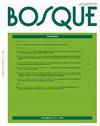Frontera agrícola y multitemporalidad de cobertura vegetal en Páramo del Parque Regional Natural Cortadera (Boyacá, Colombia)
IF 0.6
4区 农林科学
引用次数: 0
Abstract
Moorland is an ecosystem of tropical high mountain regions that plays an important role in water regulation due to its climatic, orographic and biodiversity-oriented environmental conditions. However, these qualities frequently present conflicts regarding soil use due to production activities unrelated to preservation and conservation. This study analyzes the main changes in vegetation cover (periods 1986 2000 2016) that reflect edges as agricultural frontiers, in the moorland area of the Cortadera Regional Natural Park (municipality of Siachoque, Colombia). Vegetation cover types were identified using the CORINE Land Cover methodology at a scale of 1:100,000, with the satellite image processor Landsat. Representative cover types included High open forest (Baa), dense nonwooded firm ground grassland (HdTf), mosaic of pastures and crops (Mpc), lagoons, lakes and natural swamps (LlCn) and artificial water bodies (Caa). A continuous decrease of the HdTf over time was identified (from 3,604 ha in 1986, to 3,106 ha in 2000 and 2,531 ha in 2016). In contrast, Mpc cover increased by 1,447 ha in 30 years (from 1,231 ha in 1986 to 2,678 ha in 2016). It is concluded that the changes in distribution of vegetation cover types are produced by the expansion of the agricultural frontier, despite the area’s declaration in 2015 as a protected area. These results demonstrate a clear need for this issue to be addressed through participatory action of stakeholders involved in the conservation process, restoration and preservation of the Cortadera moor.Cortadera自然区域公园(哥伦比亚博亚卡)荒地的农业边界和植被覆盖的多季节性
Moorland是热带高山地区的生态系统,由于其气候、地形和生物多样性导向的环境条件,在水调节中发挥着重要作用。然而,由于与保存和保护无关的生产活动,这些性质经常导致土壤使用方面的冲突。本研究分析了Cortadera地区自然公园(哥伦比亚Siachoque市)荒野地区植被覆盖的主要变化(1986年至2000年至2016年),这些变化反映了边缘作为农业边界。植被覆盖类型采用CORINE土地覆盖方法确定,比例尺为1:100000,卫星图像处理器为陆地卫星。代表性的覆盖类型包括高开放森林(Baa)、茂密的无树木的坚实地面草地(HdTf)、牧场和作物马赛克(Mpc)、泻湖、湖泊和天然沼泽(LlCn)以及人工水体(Caa)。随着时间的推移,HdTf持续下降(从1986年的3604公顷下降到2000年的3106公顷和2016年的2531公顷)。相比之下,Mpc覆盖率在30年内增加了1447公顷(从1986年的1231公顷增加到2016年的2678公顷)。结论是,尽管该地区在2015年被宣布为保护区,但植被覆盖类型分布的变化是由农业边界的扩张造成的。这些结果表明,显然需要通过参与Cortadera沼泽保护过程、恢复和保护的利益相关者的参与行动来解决这一问题。
本文章由计算机程序翻译,如有差异,请以英文原文为准。
求助全文
约1分钟内获得全文
求助全文
来源期刊

BOSQUE
Agricultural and Biological Sciences-Forestry
CiteScore
0.70
自引率
0.00%
发文量
0
期刊介绍:
BOSQUE publishes original works in the field of management and production of forestry resources, wood science and technology, silviculture, forestry ecology, natural resources conservation, and rural development associated with forest ecosystems. Contributions may be articles, rewiews, notes or opinions, Either in Spanish or English.
 求助内容:
求助内容: 应助结果提醒方式:
应助结果提醒方式:


